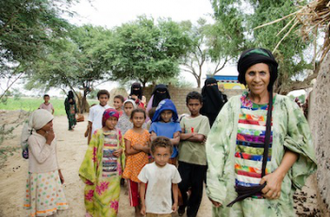Progressio urges readers to stand in solidarity with people of war-torn Yemen

Today, World Humanitarian Day (19 August) provides an opportunity to recognise those who face danger to help others, and to celebrate the spirit that inspires humanitarian work all around the world. International Development charity Progressio works alongside poor communities in fragile states, such as Yemen, where weak governance frequently results in fierce conflict. This World Humanitarian Day, Progressio is calling upon UK citizens to stand in solidarity with Yemeni people to support a permanent ceasefire in their country.
The root causes of conflict in Yemen are complex and amplified by ongoing wide-scale poverty. Yemen is the poorest country in the Middle East, and with half of the Yemeni population living on less than £1 a day, Yemeni forces are fighting each other for power and resources. Recent conflict has been fuelled by extreme public dissatisfaction towards the central government; in 2011, widespread corruption, multiple alleged human rights abuses and a lack of democratic reform led to the Yemeni Spring revolution, which ended 33 years of rule by President Ali Abdullah Saleh. In January, conflict worsened when the Houthis, a Shia-led rebel group working in alliance with Saleh's militia, seized control and forced the newly elected President Hadi to flee the capital city Sanaa.
Still recognised as Yemen's legitimate leader by the international community, Hadi and his loyalist forces have received support from the UK, USA, United Arab Emirates and Saudi Arabia, in their fight to reclaim Yemen from Houthi rule. On March 26, the Saudi-led coalition launched an air strike campaign to drive out Houthi forces in Yemen but on July 24, the coalition targeted two residential areas killing 65 civilians, including 10 children, taking the total number of civilian deaths to 1,916. Many NGOs are now calling for an investigation into many alleged violations of international human rights law in Yemen.
In addition to regular air strikes, the Saudi-led coalition imposed a naval blockade, which has forced 80 percent of Yemeni people into a state of severe humanitarian crisis. Imports make up 90 percent of the Yemen's food, fuel and medical supplies, so the blockade has left 20 million people - mostly civilians - starving and without access to safe drinking water. International humanitarian organisations claim the blockade is killing as many civilians as the air strikes, and there is a growing need for social action to encourage rebel and ally forces alike to agree to a permanent ceasefire.
Progressio, an organisation with Catholic roots, is committed to working with people of all faiths and none and has coordinated projects in Yemen since the 1970s. Progressio's 'Promoting good governance and citizens' participation in a fragile context' project is estimated to directly impact the lives of over 515,000 Yemenis. The project trains local leaders in policy analysis, advocacy and lobbying skills, which then enables them to represent the views of their communities and influence the decision-making that affects their lives.
The vast majority of people living in poverty are female. This means that gender justice, ending the inequalities between men and women, is central to Progressio's work. It is especially important in fragile countries such as Yemen, as women and girls who suffer inequality and discrimination are disproportionately affected by poverty and oppression. Yemeni families practice female genital mutilation (FGM) as a religious and cultural tradition. In the city of Hodeida, FGM has affected the lives of 97 percent of women. This is partly due to high female illiteracy rates of 62 percent as this makes it difficult for
women to learn about the dangers of FGM, which include severe pain, haemorrhaging, infection and childbirth complications, all of which can lead to death.
Progressio's 'Honour, power and expectation (HOPE) for women in Hodeida' project aims to increase awareness of domestic violence, FGM and the impact that they have on victims by training religious leaders, local authorities and health professionals about the health implications of FGM. Once trained through the HOPE project, the majority of leaders agree that FGM is a harmful traditional practice which needs to be eliminated. Working with Progressio, they educate communities about the risks of the practice, and try to change societal attitudes towards FGM.
Blessed with a stable democratic government, it can be difficult for UK citizens to fully comprehend the conflict in Yemen. The security situation is worsening: explosions have become an everyday occurrence, some Progressio partner staff have been abducted by the Houthis, and death has become an all too frequent guest. One Progressio development worker noted that 'it was extremely difficult working in Aden, as dead bodies on the street are not being collected.'
Progressio Yemen Country Representative, Abeer Al-Absi, described living amidst the conflict: "You expect to be killed at any moment either due to the air raids, or to the war in the streets. Even at home we do not feel safe. The targeting of Houthi houses has resulted in many civilian casualties. Every time, you think 'now it's my turn'."
The political unrest has led to the suspension of all five Progressio projects, and Progressio Yemen staff have been evacuated for their own safety. Progressio partners in Yemen have adapted their work to help fulfil humanitarian needs, providing food and shelter to some of the 1.3 million internally displaced persons who have been forced to leave their homes. Partners have also aligned themselves to advocate for peace negotiations, with every effort being made to see how our projects can continue to support long-term development in Yemen.
Above all, Progressio is focussing on what the conflict means for women and girls. Prior to the crisis, the situation was already poor; Yemen was ranked 142nd out of 142 in the 2014 Gender Gap Index as important disparities exist between men and women accessing education, protection, livelihood opportunities and political processes. Since the conflict, the situation for women and girls has worsened, so Progressio staff will continue to collaborate with other International NGOs to advocate for the inclusion of gender perspectives in humanitarian and development efforts in Yemen.
Abeer continues, "It is a critical time for Yemeni people; we all need to raise our voices and ask other governments, including the UK government, to push for a permanent ceasefire, removal of the blockade, as well as respecting human rights by protecting innocent civilians, in particular women and children, from the horrific implications of the war."
The situation in Yemen is extremely unstable, but there is a quick and easy way that you can help. Through the Progressio website, you can send a pre-drafted letter to David Cameron with three asks: a) to support a permanent ceasefire in Yemen, b) to ensure that women and girls' needs are addressed in all humanitarian efforts, and c) to supplying weapons only in compliance with the international humanitarian law.
Once a ceasefire is established, Progressio's work can continue to benefit the lives of Yemeni civilians. Please be an active citizen, and use your voice to help those in need.
Visit www.progressio.org.uk/yemen-crisis to write a letter to the Prime Minister and read more about Progressio's work.


















